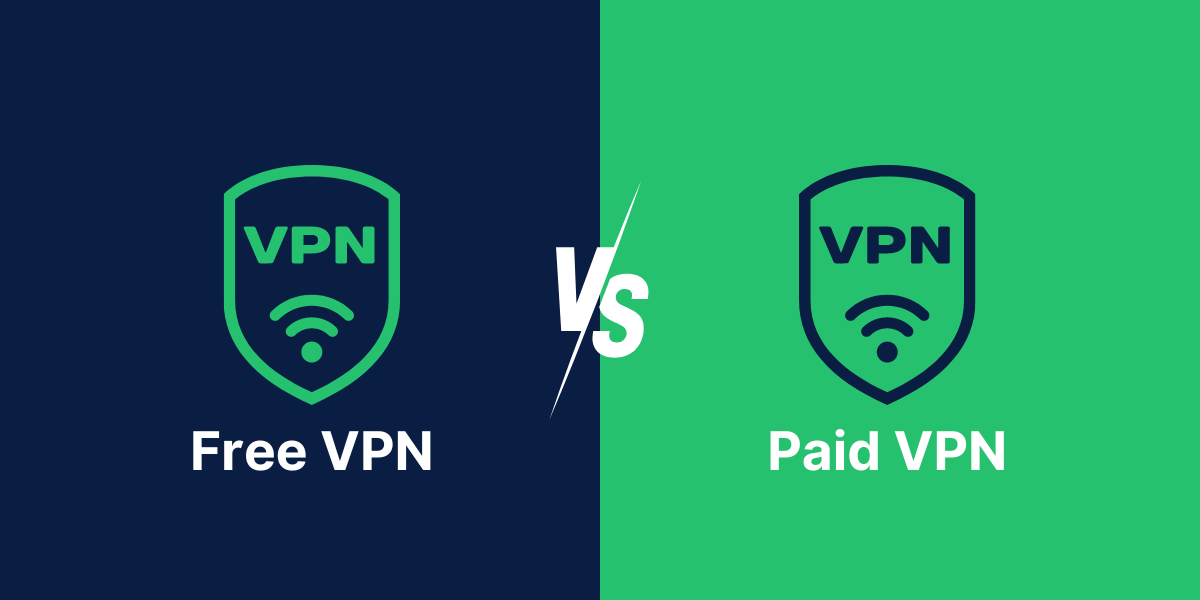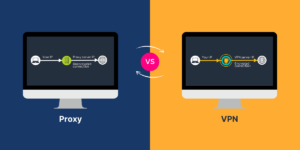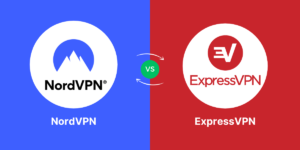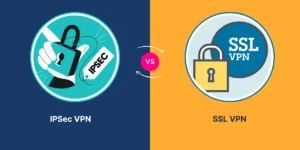What is the Difference between Free VPN and Paid VPN?
Are you aware of free VPNs or paid VPNs? Do you understand the key differences between a free VPN vs. paid VPN? No problem! This article will examine the distinctions between free VPN and paid VPN to help you make a good choice about which option suits you best.
Virtual Private Networks (VPNs) establish an encrypted connection over a less secure network, such as the Internet. VPNs create a protected tunnel for all your online communications and activity, masking your internet protocol (IP) address and hiding your online identity.
A VPN enforces a barrier between your device and the public network, encrypting all your internet traffic and obscuring your online presence. It makes your browsing data and communications private from prying eyes like hackers, ISPs, and network snoopers.
There are two primary types of VPN services:
Free VPNs offer limited features, slower speeds, and weaker security at no upfront cost. They often contain advertising or sell your information to support their “free” model. Paid VPNs provide advanced security protocols, faster network throughput, no advertising or privacy violations, and 24/7 customer support.
Paid VPN services tend to be more robust, private, and reliable than free options. They use strong encryption ciphers like IKEv2/IPsec, OpenVPN, WireGuard, and PPTP to conceal your online traffic and hide your true IP address. Paid VPNs also provide an extra layer of privacy with dedicated IP addresses, zero-logging policies, and strict no-tracking guarantees, and are based in privacy-friendly jurisdictions.
Let’s discuss Free VPN vs. Paid VPN in detail.
Key Takeaways
- Free VPNs offer basic privacy protection but have significant limitations, while paid VPNs provide robust security features and faster speeds.
- Paid VPNs do not log user activity or sell data to third parties, but some free VPNs do log and monetize user data.
- Top paid VPNs like ExpressVPN, NordVPN, and Surfshark have large server networks that deliver fast speeds, but free VPNs often have speed and bandwidth restrictions.
- Paid devices access more servers in more countries, are compatible with more devices, and can unblock more streaming content than free alternatives.
- While free VPNs are sufficient for basic web browsing, a premium VPN is recommended for torrenting, streaming, and accessing restricted content and networks.
- Factors like budget, desired features, number of devices, and use cases should determine whether a free or paid VPN makes the most sense for you.
What Are Free VPNs?
Free virtual private networks (VPNs) offer basic encryption of users’ online traffic and obfuscation of their IP addresses at no cost. However, free VPNs typically provide more limited functionality and weaker security than paid VPN services, which employ advanced features and enhanced privacy protections for a subscription fee.
The Pros of free VPNs include:
- Cost: The biggest allure of free VPNs is the $0 price tag. You incur no ongoing fees to use the basic features.
- Basic Privacy: Free VPNs encrypt traffic and mask IP addresses, providing a layer of privacy and anonymity during general web use.
- Ease of Use: Leading free VPNs have user-friendly apps for all major platforms and do not require any technical know-how.
- Data Allowances: Although capped, free VPNs do provide a monthly data allowance sufficient for basic browsing, email, messaging, and streaming.
- Server Selection: This is a small network, but free users can still switch between server locations like the US, UK, Canada, and Germany.
- Speeds: When used within data limits, free VPN speeds are adequate for casual browsing, SD video, and music.
The Cons of free VPNs
- Severe Speed Caps: Free VPNs impose bandwidth limits as low as 2-15GB per month, after which speeds are throttled to just kbps.
- No P2P Support: Free VPNs block torrenting and P2P traffic, which can hog bandwidth. Most paid VPNs permit torrenting.
- Limited Server Locations: Small server networks concentrated in just a few countries. We need more options for optimal performance.
- Session Disconnections: Free VPNs disconnect sessions frequently when capped data limits are reached, interrupting usage.
- No Advanced Features: Lack of essential tools like a kill switch, ad blocking, and malware protection offered by paid services.
- Logging and Data Mining: Free VPNs monitor traffic metadata and online activities, and some may sell data for profit.
- Limited Device Support: Generally, only 1-2 connections are allowed simultaneously. Extra devices require multiple accounts or upgrading to premium.
- Ads and Affiliate Links: Free VPN apps show intrusive ads. Traffic may be injected with affiliate links that generate commissions.
- Limited Support Options: Support is limited to web-based self-help resources—slow response times for technical issues.
What Are Paid VPNs?
Paid virtual private network (VPN) services offer robust privacy and security features for a paid membership fee. Paid VPNs encrypt users’ Internet traffic and obscure their IP addresses to mask online activity and protect anonymity. By masking identity and obfuscating location, paid VPNs enable secure connectivity and purposeful obscurity of user data not readily available through free VPN options.
The Pros of Paid VPNs:
- Lightning-Fast Speeds: No speed caps or throttling allows paid VPNs to deliver blazing fast speeds for HD and 4K streaming.
- Global Server Networks: Thousands of servers across 94+ countries for reliability, speed, and unlocking geo-restricted content.
- Unlimited Data: Use as much data as you want without caps or limits when connected to paid VPNs.
- Top-Tier Encryption: Enterprise-grade protocols like AES-256 bit encryption to shield traffic from prying eyes.
- Zero Traffic Logging: Strict no-logs policies among top paid VPNs mean no monitoring or recording of user activity.
- P2P/Torrenting Support: Download torrents safely in complete privacy with servers optimized specifically for file-sharing traffic.
- Split Tunneling: Route only selected apps through the VPN tunnel while excluding all other traffic for greater control.
- Advanced Security Features: Robust tools like malware and ad blocking, a kill switch, and IP/DNS leak protection for locking down security and privacy.
- Stream Any Content: Unblock geo-restricted content from Netflix, BBC iPlayer, Disney+, Hulu, and 200+ major streaming platforms.
- Dedicated Apps: Intuitive custom apps for all leading desktop and mobile platforms ensure ease of use for all users.
- 24/7 Customer Support: Fast live chat, email ticketing, and phone support from knowledgeable representatives whenever issues arise.
The Cons of Paid VPNs:
- Cost: With prices ranging from $2 to $15 monthly, paid VPNs do come with a recurring subscription cost, unlike free tools.
- Setup Required: Downloading apps, selecting optimal servers, and configuring settings take time compared to the instantaneous setup of most free VPN browser extensions.
- Excluded Activities: Some paid VPNs prohibit certain high-risk activities like hacking in their terms of service.
- Connection Limits: Depending on the plan, simultaneous connections are limited to 5-10 devices, requiring multiple accounts for larger numbers of devices.
- Six-Month Commitments: Most paid VPNs require a minimum six-month subscription term to access full features and discounted pricing.
- Limited Trial Periods: Many paid VPNs offer just 7-30 day money-back guarantees for testing the service risk-free before committing.
- No Refunds for Renewals: After the initial period, few VPNs provide refunds for subscription renewals made automatically or manually.
- Ongoing Expense: While competitive and justified based on features, paid VPNs still represent a recurring cost that adds up over time.
- Privacy Concerns: Despite no logs claims, trust is still required that a paid VPN will not secretly monitor and sell user data, unlike provably zero-knowledge-free tools.
Security Features of Paid VPNs:
- Encryption: Paid VPNs often offer robust encryption protocols that protect user data and prevent it from being intercepted by third parties.
- Kill switch: A kill switch is a security feature that automatically shuts off internet access if the VPN connection is lost, preventing users from accidentally exposing their IP address and online activity.
- No-logs policy: Paid VPNs with a no-logs policy do not collect or store user data, which can help to ensure user privacy and prevent data breaches.
Technically Difference Between the Free VPN vs. Paid VPN
While free VPNs can provide basic VPN functionality, paid VPNs offer superior speed, security, privacy, and additional features for a more reliable and comprehensive VPN experience.
| Feature | Free VPNs | Paid VPNs |
|---|---|---|
| Speed | Slower due to bandwidth throttling and server congestion | Faster with no bandwidth limitations |
| Data Limits | Often have data caps or bandwidth restrictions | Unlimited data usage |
| Server Locations | Limited server locations, often fewer countries | More server locations across many countries |
| Security | Basic security features, may have vulnerabilities | Advanced security features like strong encryption and leak protection |
| Privacy | May log user data and activities for advertising purposes | Strict no-log policies and commitment to user privacy |
| Simultaneous Connections | Usually limited to one device at a time | Multiple simultaneous connections allowed |
| Customer Support | Limited or no customer support | Dedicated customer support channels |
| Ad Tracking | May display ads or track user activities for revenue | No ads or tracking |
| Streaming and Torrenting | Often blocked or limited access | Access to streaming services and torrenting supported |
| Kill Switch | Rarely included | Kill switch feature to protect data leaks |
| Split Tunneling | Unavailable | Split tunneling available for selective traffic routing |
| Additional Features | Basic functionality | Additional features like malware blocking, ad-blockers, and more |
Comparing Free and Paid VPNs
Regarding VPNs, there are both free and paid options available. Here are some key factors to consider when comparing the two:
Cost Comparison between Free VPN and Paid VPN
While free virtual private networks (VPNs) seem appealing due to their lack of cost, paid VPN services generally provide superior functionality and performance for a subscription fee. Free VPNs frequently cap data allowances, reduce bandwidth, and limit server options, whereas paid VPNs commonly offer unlimited data, faster network speeds, and a wider range of locations.
Though the upfront expense of a paid VPN may be greater, paid VPNs ultimately enable a more robust virtual private network experience with enhanced privacy, security, and connectivity.
Speed Comparison of Paid VPNs and Free VPNs
Paid virtual private network (VPN) services routinely far surpass the capabilities of free VPN options by enabling significantly faster network speeds and access to a vastly larger number of server locations. As paid VPNs generate revenue through subscriber fees, they allocate substantially more resources toward infrastructure, bandwidth, and global reach.
In contrast, free VPNs typically share restricted infrastructure over a far greater number of users, drastically reducing available bandwidth and connectivity for everyone. Though free VPNs may initially seem appealing based solely on lack of cost, the performance trade-off routinely renders paid VPNs vastly superior for data-intensive uses or demanding networks requiring high-speed, low-latency connectivity.
Security Comparison between Free VPN vs. Paid VPN
While free and paid virtual private networks (VPNs) aim to encrypt traffic and safeguard users’ privacy, paid VPN services typically offer superior security through more advanced encryption algorithms and robust privacy protocols. Paid VPNs generate revenue through subscriber fees rather than collecting and monetizing user data, creating a stronger financial incentive to maintain users’ anonymity and safeguard sensitive information.
Although free VPNs may provide basic security, their free model often depends on analyzing user activity and reselling aggregate data sets, compromising privacy in exchange for no direct cost. For those prioritizing robust security and zero compromises of personal data, paid VPN subscriptions generally offer far greater protection than free VPN options.
Performance Comparison between Paid VPNs vs Free VPNs
Paid VPNs routinely provide a far superior overall user experience than free VPN options due to their advanced infrastructure, expanded server selection, and significantly faster network speeds. By generating revenue through subscriber fees rather than limited free services, paid VPNs can allocate far greater resources toward enhancing all aspects of performance, connectivity, and reliability. The result is a substantially smoother, more responsive, and dependable VPN experience for paid users across all Internet-connected devices.
Though free VPNs may function adequately for basic needs, their restrictions and lack of investment in robust infrastructure inevitably lead to lag, buffering, bandwidth constraints, and other performance issues detracting from usability. Only through the comprehensive capabilities of paid VPN subscriptions can users truly have seamless, uninterrupted connectivity and encrypted surfing.
Usability Comparison between Free VPN vs. Paid VPN
Paid virtual private network services routinely offer a far superior user experience encompassing a more intuitive interface, enhanced features, superior customer support, and greater versatility across diverse use cases. Paid VPNs frequently incorporate additional functionality such as a kill switch, split tunneling, and ad blocking beyond basic encryption and anonymity. They also provide enhanced support resources to guide users effectively through any complexities.
Though the lack of cost may initially allure some to free VPN options, paid VPN subscriptions ultimately prove the far wider choice for most by enabling dramatically faster network speeds, infinitely more robust security, seamless performance, and a wealth of additional ease-of-use features. However, as with any technology, the optimal VPN remains highly dependent upon individual needs, demands, and budgets.
What Activities Are Free VPNs Good For?
While lacking many advantages of paid VPNs, free virtual private networks do offer sufficient privacy for more casual and light use cases.
- Web Browsing: The core purpose of any VPN is basic private web browsing. Free VPNs provide adequate encryption and IP masking when accessing typical sites and services.
- Securing Public Wi-Fi: Connecting to free public hotspots with a VPN adds a layer of protection against man-in-the-middle attacks by hackers.
- Accessing Light Social Media: Free VPN browsing data allowances accommodate typical use of most social platforms, such as Twitter, Reddit, and light Facebook usage.
- Communication via Messaging: Chats via Signal, WhatsApp, Telegram, and other secure messaging apps work fine over a free VPN connection.
- Voice/Video Calls: Free VPNs permit encrypted VoIP calling via Skype, FaceTime, WhatsApp, and other platforms with minimal impact on call quality.
- Bypassing Moderate Censorship: When traveling abroad, a free VPN may be sufficient to bypass government censorship and access moderately blocked news and social sites.
- Basic Streaming: With a free VPN, you can stream video from YouTube, Twitch, and other sites in moderate amounts without hitting data caps.
What Activities Are Paid VPNs Ideal For?
Unlike free tools, premium virtual private networks are optimized for activities that require high speeds, unlimited data, and robust privacy.
- Media Streaming in HD and 4K: With unrestricted bandwidth and lightning speeds, paid VPNs deliver lag-free streaming of HD and 4K quality video content.
- Torrenting and P2P Activities: Paid VPNs permit safe peer-to-peer downloading of torrents in complete privacy by masking IP addresses from prying eyes.
- Gaming Online: Top-paid gaming VPNs reduce ping and latency by connecting to nearby servers optimized for handling gaming traffic.
- Accessing Geo-Blocked Content: Paid VPNs unlock regionally restricted content from Netflix, Hulu, BBC iPlayer, and 200+ major streaming platforms worldwide.
- Using Public Wi-Fi Securely: Paid VPN encryption and cybersecurity tools like a kill switch provide complete protection when accessing public hotspots.
- Bypassing Government Censorship: The most restrictive censorship is thwarted using paid VPN proxy connections routed through unrestricted countries and territories.
- Remote Access to Restricted Networks: With split-tunneling, paid VPNs securely and privately grant remote access to company networks and tools.
Which VPN Should You Choose?
Choosing a VPN (Virtual Private Network) can be daunting, given the many available options. Here are some factors to consider when selecting the best VPN for your needs:
- Purpose of VPN Use: The primary consideration when choosing a VPN is why you need it. Since VPNs have varying strengths and weaknesses, choosing one that matches your intended usage is crucial. For instance, if your objective is to access unavailable streaming services in your country, you must select a VPN with servers in the region where your preferred streaming service is based.
- Budget: Another vital factor to consider is your budget. Many free VPN services are available, but ads may support them or have limited features. Paid VPNs offer more features and better performance but can be more expensive. Determine how much you will spend and compare different VPN features in your price range.
- Security Concerns: One of the primary reasons people use VPNs is to increase their online security. When choosing a VPN, look for one with robust encryption protocols and a no-logging policy. Additionally, consider the VPN’s jurisdiction and whether it is subject to government surveillance or data retention laws.
- Privacy Concerns: Besides security, privacy is another primary concern for VPN users. Look for a VPN with a strict privacy policy and not selling user data to third parties. Additionally, consider whether a third-party security firm has audited the VPN to verify its privacy and security claims.
Final Thoughts
This in-depth guide examines the key differences between free and paid VPN services to help you decide which is better for your needs. Paid VPNs provide faster speeds, more server locations, unlimited data, and robust privacy features. The free VPNs can handle basic web browsing within data limits. Paid VPNs are ideal for streaming, torrenting, gaming, and bypassing censorship. However, free VPNs work for lighter use, such as social media and communications.
The article explores the pros and cons of both options and the activities each is suited for. With insights on privacy, security, speed, and use cases covered, this guide aims to you determine if a free or paid VPN makes the most sense for you.
FAQs About Free vs. Paid VPN Services
Is a free VPN safe?
Free VPNs provide a basic level of security sufficient for casual web browsing. However, data limits, lack of advanced tools, and logging policies make most unsuitable for sensitive online activities compared to paid VPNs.
Do free VPNs sell user data?
Some free VPNs admit to selling anonymized usage data and patterns to third-party advertisers and marketers. Paid VPNs do not monitor or sell user data.
What are the risks of using a free VPN?
Beyond lower security, free VPNs can expose you to risks like identity theft if logging policies are unclear. Speed throttling also interrupts usage, and ads and affiliate links raise privacy issues.
Is it illegal to use a free VPN?
Using any VPN, free or paid, is legal in most regions. However, free VPNs are more likely to host servers in countries with questionable jurisdictions, and some paid VPNs exclude high-risk nations.
Can free VPNs access streaming sites?
The unblocking capabilities of free VPNs are very limited. Bandwidth restrictions typically prevent streaming for more than a few minutes. Only paid VPNs deliver unlimited streaming access worldwide.
Do paid VPNs keep logs?
All leading paid VPN providers enforce strict zero-logging policies. No user activity is monitored or stored, and trusted audits help validate the legitimacy of claims without logs.
Is a paid VPN worth the money?
For power users needing unlimited data, top speeds, robust privacy tools, and unrestricted access worldwide, a premium VPN is very worthwhile, given the protection and utility provided.
What are the downsides of paid VPNs?
The main downsides are ongoing cost, required setup, and placing trust in the provider’s no-logging policies. Limits on simultaneous connections and trial periods are additional paid VPN tradeoffs.
Can I try a paid VPN risk-free?
Major paid VPNs offer 30-45-day money-back guarantees. You can test drive the service and, if unsatisfied, receive a full refund within the trial window. This allows for a risk-free evaluation.
How much should I spend on a paid VPN?
Quality paid VPNs start around $2-$3 monthly when you commit to 6-month or 1-year plans. ExpressVPN and NordVPN offer the best value at under $10 monthly, but even budget VPNs beat any free option.

 Verified A Professional Content Writer
Verified A Professional Content Writer
Riha Mervana is a professional content writer at SearchVPN.org, with extensive experience crafting engaging and informative content. She has established herself as an expert in the VPN industry, creating content that educates readers on the importance of online privacy and security.



